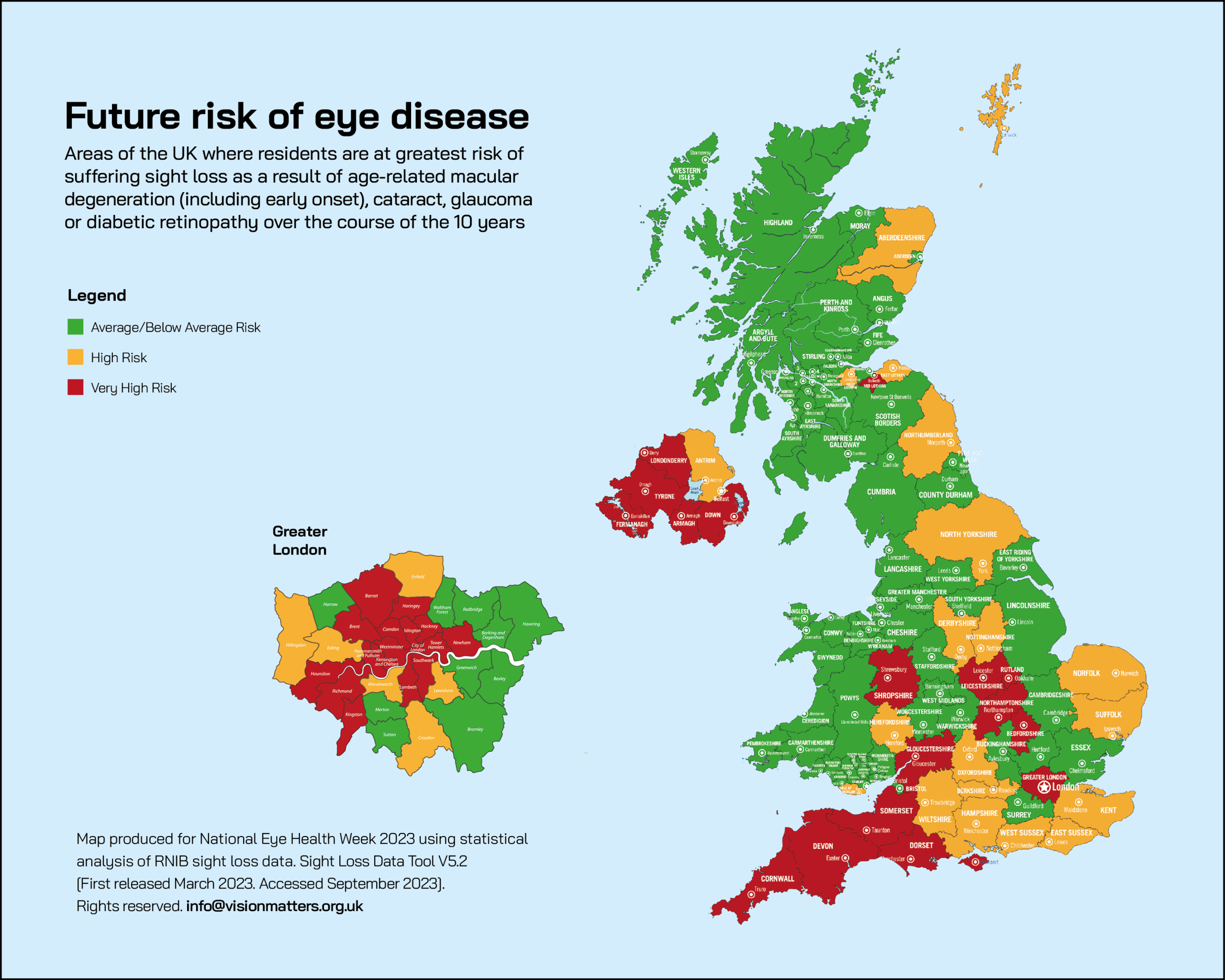A nationwide campaign has been launched to encourage people to prioritise regular eye tests as data reveals that 4.7 million NHS sight tests have been missed due to disruptions in healthcare routines caused by the pandemic [1]. In addition, 1 in 5 individuals postponed or canceled their sight tests in the past year due to cost concerns [2].
This campaign is part of National Eye Health Week (18-24 September) and aims to raise awareness about the importance of eye care. Health analysts predict that an additional million Britons will experience one of the four main causes of blindness in the next decade. Cases of late-stage age-related macular degeneration (AMD), the leading cause of sight loss in the UK, are estimated to increase by 25% by 2032. Other conditions such as early-stage AMD, cataracts, glaucoma, and diabetic retinopathy are also expected to rise [3].
The attached map highlights areas in the UK at increased risk of future eye disease, including North-East Derbyshire, the London Borough of Tower Hamlets, Milton Keynes, and Mid-Ulster.
David Cartwright, Chair of Eye Health UK, emphasises the importance of prevention, early diagnosis, and treatment of common eye conditions in reducing unnecessary sight loss. He notes that half of sight loss can be avoided through regular eye checks, a healthy diet, staying active, and wearing sun protection.
Regular sight tests are crucial health checks, even for those who believe their eyes are healthy, as they can detect microscopic changes inside the eye that may go unnoticed. Optometrists can identify issues such as glaucoma years before noticeable changes in vision occur. Moreover, eye changes can indicate underlying health conditions like high blood pressure, raised cholesterol, and the risk of stroke and heart disease.
Health Minister Neil O’Brien emphasises that free NHS eye tests are available for several groups, including children, people aged over 60, and those on income-related benefits. The government has also invested over £100 million in eye condition research in the past five years.
Broadcaster, model, and activist Katie Piper OBE underscores the importance of routine sight tests for her family, noting the rapid changes that can occur with eye health.[4]
To assess your risk of future sight loss, you can use the online eye health calculator on the National Eye Health Week website (visionmatters.org.uk).
[1]Calculated using NHS GOS Statistics for England, Wales, Scotland and Northern Ireland. Comparison of sight test volumes for the period Apr 2017 – March 2020 Vs Apr 2020 – March 2023. England Total 39,613,397 Vs 36,442,138. Wales Total 2,399,250 Vs 1,895,265. Scotland 4,526,138 (2018/2020) Vs 3,689,792 (2020/2022). Northern Ireland 1,403,708 Vs 1,193,732. Total Variation 4,721,566. England down 3,171,259, Wales down 503,985, Scotland down 836,346; NI down 209,976 compared to pre pandemic period.
[2]Survey of 2,003 UK Adults commissioned by College Optometrists, May 2023.
[3] Calculated using RNIB, Sight Loss Data Tool V.5.2 accessed September 2023. Figures include patients in early stages of eye disease who might not have recognised symptoms.
[4] From an exclusive interview Katie has given to Vista, the official National Eye Health Week magazine. Cover image attached.
[5]Kristin J. Myers et al. Ophthalmology Journal Vol 122






